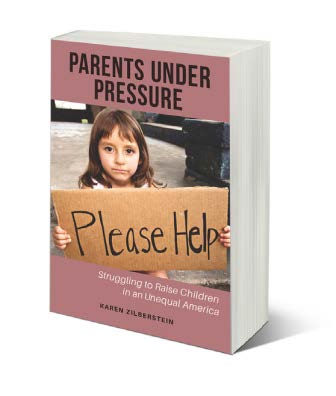BOOK EXCERPT
PARENTS UNDER PRESSURE STRUGGLING TO RAISE CHILDREN IN AN UNEQUAL AMERICA
BY KAREN ZILBERSTEIN, LICSW
CHAPTER TWO EXCERPT
The System is Down recounts the struggles of Victoria and Nathaniel, whose children suffer from multiple disabilities, and delves into the impact of America's social service systems on families' income, isolation and health.
"Most parents push their kids too much," said Victoria. "You have to be proud of them, just appreciate that they are walking and breathing." She speaks with the authority of hard-earned experience. Only one of Nathaniel and Victoria's two children walk, and even then, with a limp, although both can now breathe independently. Achieving that outcome has not come easily.
When they were infants, the care of Olivia and Autumn, twins born premature and with cerebral palsy, took eighteen hours a day, sometimes more. An apnea monitor, which tracked Olivia's breathing and heart rate, necessitated vigilant supervision. Steroids to enhance their lung functioning needed to be sprayed through their reluctant mouths. Each baby required feeding every few hours, and their mouths wiped clean afterwards so that they would not develop thrush. With weak musculature, they found digestion difficult, requiring the administration of medications for gastroesophageal reflux disease. Their tiny diapers needed frequent changing, and their monitors had to be unhooked and refastened before and after bathing. They were undersized and fragile, a constant source of concern.
A home health aide helped a few hours a day, but the majority of the care fell to Victoria and Nathaniel. The incessant attention to medical needs, frequent medical appointments, and endless wor ries created strain. "I had one experience when we had to bottle feed them," remembered Nathaniel. "You had to support them and hold this tiny little bottle of formula with only about four drops, and they had to suck on the bottle, but you had to position their heads properly. And Autumn was choking. I was terrified. I said, 'I can't do this.' There were all these insane challenges. We were constantly in a state of vigilance over medical issues. We weren't in this happy afterglow."
Autumn presented bigger challenges than Olivia. At nine months old, she started banging her head. Victoria and Nathaniel had installed swings for the girls in the doorway of the living room and Autumn would lean out of the swing in order to whack herself on the posts. They would carefully snuggle her back in, secure her in the swing, and pad the posts with pillows, but she continued to bang. Sometimes she banged with such vigor that she scarred herself and shook the house. She also started to rock, vigorously pulsating back and forth. She enjoyed humming, as well, producing a discordant, bitonal, and jarring sound. The banging and cacophonous hum, repeated endless times a day, pelted Nathaniel and Victoria's nerves.
Encouraging, but intermittent signs of progress punctuated Autumn's repetitious behaviors. During her second year, she began to talk and respond. She would sit on the couch and ask for food, videos, or objects, delighting her parents. She progressed to one or two-word commands before her speech completely evaporated. As her skills slipped, so did hopes of a functional childhood. By age three, she had collected a variety of diagnoses: autism, cerebral palsy, gastroesophageal reflux disease, and chronic idiopathic constipation. When her sister started walking, Autumn was still tackling independent sitting. She never mastered toilet training.
Autumn's numerous medical conditions necessitated so much care and so many appointments that at times her twin got pushed into the background. Her parents wished they could spend more time talking, coloring, or playing dolls with her. They worried that they did not do enough.
"Because Autumn took so much," they said, "we felt like we didn't have time for other things, even our own relationship. And you feel guilty thinking you want that, because you are basically trying to keep your child alive and functioning and trying to push her forward."
Along with the daily demands of Autumn's care, a constant flow of unpredictable difficulties cascaded through the family's life, threatening to overrun its banks. Taking the girls anywhere involved a massive production of assembling and carrying equipment: wheelchairs, medicines, special foods, and large diapers and wipes, even when Autumn was full-grown. The equipment itself was vulnerable to malfunction. Autumn rocked so violently that she broke more than one of her wheelchairs. Without it, she could not attend school. In addition, as Autumn grew and put on weight, she became more difficult to manage, and Victoria could no longer lift her. Victoria threw out her back in one attempt, from which she never fully recovered. After the first few years, it thus became clear that Nathaniel's full-time presence at home was sorely needed.
The pressing issue was not just Nathaniel's time and labor, but also how his job affected family finances and services. His income, as well as their limited nest egg, turned out to be a hindrance, pricing them out of certain benefits. When he worked, the girls did not qualify for subsidized state health insurance or for Supplemental Security Income (SSI), the Federal income supplement program started in 1975 to help low-income individuals with disabilities. SSI only allowed $3000 in family sav ings and cut awards if families owned more. Other services, such as Personal Care Attendants (PCAs), which they sorely needed for Autumn, were only available to those with state health insurance.
Sorting out and applying for benefits took time. A labyrinth of bureaucracies confronted them, agencies and programs with their own twists, turns, obstructions, and dead ends. Each required a suffocating amount of research, applications, coordination, and, all too often, battles. "It's constant," said Nathaniel, "it's been one challenge after another. While one system is helping, you are locked out of others through economics. Obtaining different programs or services is seen as double-dipping, but really, they cover different things. So, you need to do the research on services, become the experts, and try not to make an enormous mistake at the same time." Services, however, are often in short supply and hard to procure. A lack of adequate funding perpetuates the problem, reflecting America's confusion about how much the care of distressed families should exist as a private, household concern or a public responsibility, whether individuals with disabilities are valued as assets or demonized as drains on society's coffers.
Throughout history, before industrialization and the primacy of the nuclear family, communal responsibility for children's well being was more often the norm. Cross-culturally, in less wealthy communities, supervision and nurturance of children was augmented by alloparents, who could be fathers, grandmothers, aunts, siblings, or non-relative caregivers. Children's high caloric needs, extended period of dependency, and early weaning, which allows a mother to birth and care for multiple offspring simultaneously, rendered cooperative childrearing a necessity. Parents could not produce adequate resources for themselves and their children without the help of others.
The independent nuclear family, scrambling on its own to provide for children, emerged only recently. As populations increased in the Western world, families divided into smaller units, and resources became allocated unevenly, parental efforts focused more and more on helping their own offspring gain advantage, especially in those segments of society well-resourced enough to sit atop and succeed in the economic food chain.
The trend towards individual, rather than communal responsibility, has been accelerated by public policies and rhetoric. In the early 20th century, as the country faced the devastation of the Great Depression, the government showed greater interest in buttressing citizens' well-being. The Social Security Act of 1935 established a safety net that grew to aid the elderly, unemployed, poor, disabled, veterans, and others. Public benefits peaked in the 1970s, after which a stalling American economy, and policies tilted towards companies, led to reforms and cuts. By the 1980s, political philosophies inflating the message that individual choice, rather than social or public benefit, shapes success began drifting into family life.
"Part of the belief," said sociologist Linda Blum from her office at Northeastern University, "is that it is our responsibility to work on ourselves continuously. We must train our brains and maximize our physical health. When you are talking about kids, those tasks fall on mothers. Individual responsibility for that health maximization is very intense right now. People don't recognize that it's new. And they don't recognize what it is covering up, which is the lack of social and public responsibility."
The end result is that families like Victoria and Nathaniel's, who face demands that exceed their resources, are left isolated and struggling, without the supports they desperately need.•

ABOUT THE AUTHOR:
Karen Zilberstein, LICSW, is a practicing psychotherapist and Clinical Director of the Northampton, MA chapter of A Home Within, a national nonprofit that provides pro bono psychotherapy for individuals who have experienced foster care.

Title: Parents Under Pressure: Struggling to Raise Children in an Unequal America Author: Karen Zilberstein Publisher: Levellers Press Publication Date: March, 2019 ISBN-13: 978-1945473791 Available at levellerspress.com and amazon.com
WINNER OF TWO 2019 NEXT GENERATION INDIE BOOK AWARDS